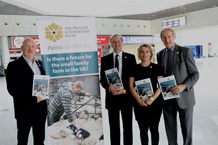
Matt Lobley and Michael Winter with Claire Saunders, Director and Lord Curry, Chairman of The Prince’s Countryside Fund
Major study reveals steep decline in number of small family farms
A major new independent study commissioned by The Prince’s Countryside Fund into the future of small family farms across the UK, has revealed a steep decline in numbers since the beginning of the century.
Over the last two or three decades, small family farms have experienced profound change. The report set out to explore the future for these farms by identifying the pace of change, investigating ways in which they might improve performance and viability as well as putting forward proposals for improvements to farm management, adjusting policies and bringing in new blood.
Overseen by Professor Michael Winter, a rural policy specialist and rural social scientist at the University of Exeter, the report revealed a complex pattern of change with the number of farms declining by half and showed many smaller farms had been consolidated into expanding larger farms.
One of the largest risks was identified as farm succession. Without the correct retirement planning and restructuring in place, it is claimed it will make it more difficult for the ‘older generation to step back’, yet it confirms that the ‘most profitable farms are those most likely to have a successor, regardless of size’.
With significant agricultural pressures including volatility in milk, beef and lamb prices and weak export trade and domestic demand, the study notes that there is ‘not necessarily a future for all small family farms’ but that not all of these businesses require a sizeable profit. Furthermore, top performing small family farms are found to be as efficient as many larger farms.
Powerful economic forces have continued to drive change in farm size structures and Britain’s family farms continue to face the ‘agricultural treadmill’ – meaning ever larger volumes of outputs are needed just to ‘stand still in net income terms’. In addition, the Basic Payment Scheme contributes over 100% of farm business income on most small mixed farms, highlighting how vulnerable they could be to a significant reduction, or loss, of this payment.
Lord Curry, chairman of The Prince’s Countryside Fund said: “There is a limit to which small farms can resist the constant pressures being put on them and their resolve is being continually tested. There has been very little research done in recent years into this sector, so I am hopeful that Professor Winter’s recommendations will provide a new catalyst for action to ensure we have a thriving sector for the years ahead.”
In a bid to respond to contemporary challenges and identify ways to increase the viability of family farming, the report proposes a series of 17 recommendations which include:
• Improvements to farm management and performance to enhance resilience of the small farm such as greater financial management, technical knowledge, market knowledge and social/emotional intelligence and awareness.
• A need to upskill the agricultural sector through targeted advice and training as well as encouraging farmers to take an active role in sharing best practice and analyse success.
• Improve economic resilience by shortening the supply chain and increasing profits.
• Introduce and develop initiatives to encourage new blood into agriculture and see succession planning as an investment into the future of their business and family.
Claire Saunders, director of The Prince’s Countryside Fund said: “It has been heartening to learn from the report how innovative many small farms are, and the positive contribution that they continue to make to the rural landscape with strong social, community and economic benefits. Support is needed now to retain viable enterprises and to encourage the next generation into farming. The Prince’s Countryside Fund is developing new initiatives to support these businesses and help those who live and work in the countryside.”
Report co-author Professor Michael Winter said that “official figures on change in farm numbers and farm size structure only tell part of the story. Our own research points to a much more complex and nuanced pattern of business growth, decline, exit and new farm start-ups, as well as the occupancy of land under a range of informal and unconventional arrangements.”
Report co-author Professor Matt Lobley added: “Surviving in the short term can be tough enough but the longer term survival of small family farms can be jeopardised by a lack of succession planning and provision for retirement. It is vitally important to ensure a dignified retirement for elderly farmers alongside active planning for succession.”
The Prince’s Countryside Fund, which earlier this month announced over £550,000 of funding support for inspiring rural initiatives through its grant giving programme, will be announcing details of a new rural support programme at the end of July.
Date: 8 July 2016


